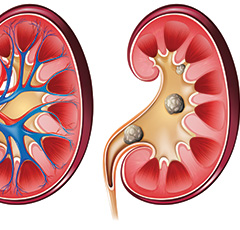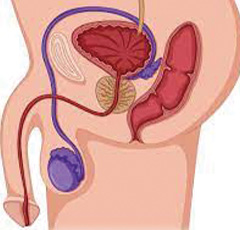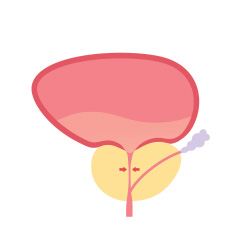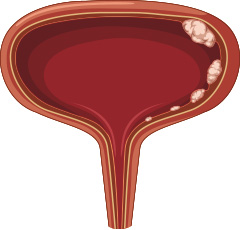Overview
The Urology Department specializes in diagnosing and treating disorders of the urinary tract and male reproductive system. Our team of experienced urologists provides comprehensive care for conditions such as urinary tract infections, kidney stones, prostate issues, and male infertility. Utilizing advanced diagnostic tools and minimally invasive surgical techniques, we are dedicated to improving patient outcomes and quality of life. Our goal is to offer personalized treatment plans that address each patient’s unique needs.
TREATMENTS & PROCEDURE

Comprehensive care for diagnosing and treating kidney stones using minimally invasive techniques.
Kidney stone management includes non-invasive treatments like shock wave lithotripsy and minimally invasive procedures like ureteroscopy and percutaneous nephrolithotomy. These methods break down or remove stones to relieve pain and prevent complications.

Advanced diagnostic and treatment options for prostate cancer to ensure the best outcomes.
Prostate cancer treatment includes active surveillance, radiation therapy, surgery, and hormone therapy. Our team provides personalized care plans based on the stage and aggressiveness of the cancer to optimize treatment effectiveness and minimize side effects.

Minimally invasive procedures and medications to treat BPH and improve quality of life.
BPH treatment includes medications, minimally invasive procedures like transurethral resection of the prostate (TURP), and laser therapies. These treatments alleviate symptoms such as frequent urination, difficulty urinating, and incomplete bladder emptying.

Comprehensive care for diagnosing and treating urinary incontinence with personalized solutions.
Urinary incontinence treatment includes lifestyle changes, pelvic floor exercises, medications, and minimally invasive procedures like bladder sling surgery. Our goal is to help patients regain bladder control and improve their quality of life.

Diagnostic and treatment options to address male infertility and improve reproductive outcomes.
Male infertility treatment includes hormone therapy, medications, surgical interventions like varicocelectomy, and assisted reproductive technologies (ART) such as IVF and ICSI. We provide personalized care to address underlying causes and enhance fertility.

Advanced diagnostic and therapeutic options for bladder cancer to ensure optimal care.
Bladder cancer treatment includes transurethral resection of bladder tumor (TURBT), chemotherapy, radiation therapy, and immunotherapy. Our multidisciplinary approach ensures thorough care and the best possible outcomes for our patients.
Comprehensive care for diagnosing and treating kidney stones using minimally invasive techniques.

Kidney stone management includes non-invasive treatments like shock wave lithotripsy and minimally invasive procedures like ureteroscopy and percutaneous nephrolithotomy. These methods break down or remove stones to relieve pain and prevent complications.
Advanced diagnostic and treatment options for prostate cancer to ensure the best outcomes.

Prostate cancer treatment includes active surveillance, radiation therapy, surgery, and hormone therapy. Our team provides personalized care plans based on the stage and aggressiveness of the cancer to optimize treatment effectiveness and minimize side effects.
Minimally invasive procedures and medications to treat BPH and improve quality of life.

BPH treatment includes medications, minimally invasive procedures like transurethral resection of the prostate (TURP), and laser therapies. These treatments alleviate symptoms such as frequent urination, difficulty urinating, and incomplete bladder emptying.
Comprehensive care for diagnosing and treating urinary incontinence with personalized solutions.

Urinary incontinence treatment includes lifestyle changes, pelvic floor exercises, medications, and minimally invasive procedures like bladder sling surgery. Our goal is to help patients regain bladder control and improve their quality of life.
Diagnostic and treatment options to address male infertility and improve reproductive outcomes.

Male infertility treatment includes hormone therapy, medications, surgical interventions like varicocelectomy, and assisted reproductive technologies (ART) such as IVF and ICSI. We provide personalized care to address underlying causes and enhance fertility.
Advanced diagnostic and therapeutic options for bladder cancer to ensure optimal care.

Bladder cancer treatment includes transurethral resection of bladder tumor (TURBT), chemotherapy, radiation therapy, and immunotherapy. Our multidisciplinary approach ensures thorough care and the best possible outcomes for our patients.
Diseases treated
FAQs
Symptoms include severe pain in the back or side, blood in urine, nausea, and frequent urination. Immediate medical attention can help manage and treat kidney stones effectively.
Treatments for BPH include medications, minimally invasive procedures like TURP and laser therapies, and lifestyle changes to alleviate urinary symptoms and improve quality of life.
Male infertility can be caused by hormonal imbalances, varicoceles, infections, or blockages. Diagnostic tests and treatments like hormone therapy, medications, and assisted reproductive technologies can help.
UTIs are typically treated with antibiotics. Drinking plenty of water and practicing good hygiene can help prevent recurrent infections.
SWL is a non-invasive procedure that uses shock waves to break kidney stones into smaller pieces, allowing them to pass through the urinary tract more easily. It’s effective for treating certain types of kidney stones.
Prostate cancer is diagnosed through a combination of PSA blood tests, digital rectal exams (DRE), and biopsies. Early detection is crucial for effective treatment.
Urinary incontinence can be treated with lifestyle changes, pelvic floor exercises, medications, and minimally invasive procedures like bladder sling surgery, tailored to each patient’s needs.
Bladder cancer treatments include TURBT, chemotherapy, radiation therapy, immunotherapy, and in advanced cases, radical cystectomy with urinary diversion.
Follow-up care typically involves monitoring for any complications, managing pain, and ensuring proper healing of the incision sites.
Urology Doctors



Dr. Nawal Abdullah Al Sharji
Consultant - Pediatric Surgery and Pediatric Urology


Dr. Jaya Sai Sekhar Boyina
Specialist urologist (Visiting consultant at Sohar Hospital)















